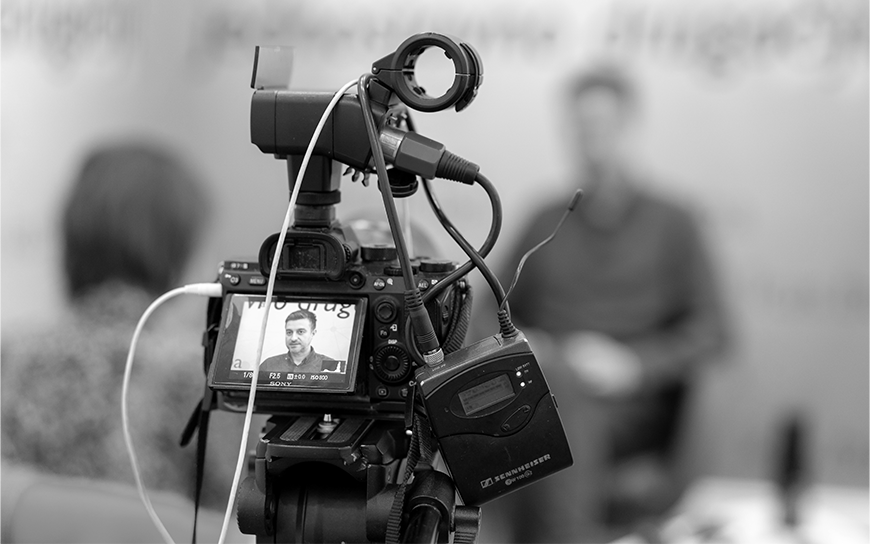“Corruption is the biggest issue we face in Bosnia and Herzegovina,” says Dinko Dundić, Chief-editor of Fokus, an independent news portal that is now one of the country’s most influential media.
“Corruption permeates all levels of society. It is a way of life. Everything here is corrupt – our social system, our healthcare system, our educational system, all of our public institutions. The whole system is corrupt. Our politicians are not motivated to improve things as they benefit too,” he says.
Exposing this corruption is the focus of Fokus’ work. Three of its 11 staff are investigative journalists, who spend many months investigating cases and writing them up as stories that have a big impact across the country.
Multi-million Euro ventilator scam
In 2021, Fokus’s journalists revealed a massive million Euro fraud, when the federal government of Bosnia and Herzegovia paid over €5 million to a Chinese company for 100 ventilators worth just €100,000. Ventilators that were useless for the treatment of Covid-19, and that in the opinion of medics would have been more likely to kill patients than to save them. These machines are currently gathering dust hospitals around the country. The Prosecutor General arrested the former prime minister of the Federation of Bosnia and Herzegovina, who at the time of interview with EED was awaiting trial for embezzlement of public funds.
Dinko expects that it is unlikely the prime minister will be convicted of the crime, as he suspects political strings will be pulled. However, he still believes that this investigation was a success. “By getting this case to court, we have warned those in power that they can no longer get away with these crimes,” he says.
Such success may be applauded by the public, but in certain circles it does not make Dinko a popular man. He has been vilified on social media and has been the subject of direct threats. For a while, the Fokus team needed police protection to keep working. Now they have moved their office to a new location nearer a police station, which they hope offers some kind of security to the team.
A media that does not take sides
Such threats do not overly bother Dinko and they certainly will not stop the journalists’ work. Dinko knows that Fokus have strong public support for their work from all parts of the country, and from all ethnic groups. “They know we are objective and we don’t take sides. They know we tell the truth,” he says.
This tenaciousness is part of the Fokus journalists’ DNA.
Dinko and four colleagues, all journalists with at least a decade of experience behind them, set up Fokus in 2014 at a time when much of Bosnia and Herzegovina was underwater during the massive flooding of that year.
They wanted to write about the topics that really mattered to them – “without being beholden to any bosses”, as he puts it, noting that most local media outlets are owned by businesses or have political links and are under constant pressure toe the line. Topics like: the lack of infrastructure, public transport, healthcare, a poorly functioning judicial system, challenges faced by marginalised groups like LGBTQI+ people and minorities, that are barely written about elsewhere, and where Fokus believe they can make a change.
The five journalists worked on a voluntary basis for the first two years, and they became the second most popular online media with virtually no finance.
EED funding at a critical time
EED has provided several grants to Fokus. An initial grant provided during the Covid-19 pandemic came at a crucial time for the media. “We had enough money to survive another two months at that point. I really thought we would have to shut down. EED saved us. It really took the pressure off. We knew we had enough money to pay salaries and other operational costs for a year.,” says Dinko.
A more recent EED grant is helping Fokus turn some of their written content into short videos and infographics for distribution across social media, as Dinko and its team work to increase the reach of their stories and diverse their revenue sources.
Fokus is also unique in Bosnia, in that it is owned and run by its employees, who now number 11, and it also provides its journalists with secure contract, paying the very high local security charges, which top 70 percent. This is unusual in a country where journalists are often poorly paid and have little contractual stability.
Dinko admits that running a small independent media is never easy. Not only is he responsible for the financial viability of the outlet and for paying salaries, he also has to navigate the algorithms of social media where rules on posts and potential monetisation constantly change which constantly change, as well as having responsibility for all the other small operational issues of running any small business.
He also admits that the media environment in Bosnia and Herzegovina has become more difficult over the years, and it is becoming more difficult to recruit young journalists to the field.
He is determined to keep going. “Investigative journalism is our raison d’etre. This is an expensive type of journalism as it can take several months to complete an investigation, but we are not in the game of fast, easily marketable journalism. Independent media is about the only thing that works in our country. If we give up, what else is there?” he says.
He believes that the authorities are taking notice of their work. “They notice what we write. They are frightened of us. That’s why they keep pressurising us,” he says.”
This article reflects the views of the grantee featured and does not necessarily represent the official opinion of the European Endowment for Democracy, the European Commission or any other European State or other contributors to EED.
